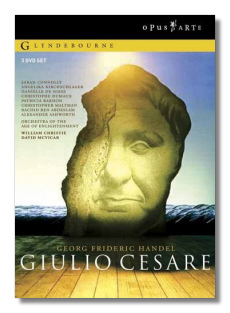
The Internet's Premier Classical Music Source
Related Links
- Handel Reviews
- Latest Reviews
- More Reviews
-
By Composer
-
Collections
DVD & Blu-ray
Books
Concert Reviews
Articles/Interviews
Software
Audio
Search Amazon
Recommended Links
Site News
 DVD Review
DVD Review
George Frideric Handel

Giulio Cesare
- Sara Connolly (Giulio Cesare)
- Angelika Kirchschlager (Sesto)
- Danielle De Niese (Cleopatra)
- Patricia Bardon (Cornelia)
- Christopher Maltman (Achilla)
- Christophe Dumaux (Tolomeo)
- Rachid Ben Abdeslam (Nireno)
- Alexander Ashworth (Curio)
Glyndebourne Festival Chorus
Orchestra of the Age of Enlightenment/William Christie
Opus Arte OA0950D 3DVDs 305mins
"Entertainment is not a dirty word," director David McVicar insists in one of this set's bonus featurettes, and how true that is. Lively, imaginative staging, expertly realized by the singers, is the key to the success of this Glyndebourne production, which dates from the summer of 2005. I recently reviewed a Barcelona Cesare on DVD, and roundly criticized it for turning the opera into a muddled archaeological fantasy that was loaded with so much stage busy-work that Handel's music was pushed into the background. Like Herbert Wernicke, the director of the Barcelona production, McVicar has changed the opera's setting – this is an 19th-century Egypt at the time of the British occupation – but the idea of dressing Caesar as a British general, and so on, actually works very well because the director sticks with it. McVicar sees his concept through, unlike Wernicke, who seemed simply to be interested in doing something different with the opera, whether it made sense or not.
This clever production owes a lot to Broadway, actually, and that's not a bad thing. The singers also are asked to be credible actors, and they are that, and more. Some also dance. Many of the arias are intricately choreographed in a manner inspired by – so says McVicar – Bollywood films. There are impressive fight scenes too, and plenty of meaningful stage business. No one just plants their feet and sings. This opera's three-plus hours just flew by. Lest one get the impression that this Cesare is all about spectacle and nothing else, rest assured that McVicar allows the opera's contemplative moments – for example, "Son nato a lagrimar" at the end of Act One – to speak for themselves. Although there's much to see in this Glyndebourne production, Handel's delicious music never is in any danger of being forgotten.
For me, the discovery of this production was Danielle De Niese, a young soprano who comes from Los Angeles. Her Cleopatra is witty, sexy, and very adorable. Vocally, she reminds me of a young Kathleen Battle. She has the Glyndebourne audience eating out of her hand, and I look forward to seeing and hearing more of her. As Cesare, Patricia Connolly convincingly turns herself into a late middle-aged man, and a ruler with unbounded charisma. She too is an astonishing singer – "Va tacito e nascosto" is a showpiece of Baroque skill – and she shows a gift for embellishment, particularly in her Act Two aria (inspired, Connolly tells us in the bonus featurette, by the singing of thrushes outside her home). Kirchschlager also turns herself into a convincing man, albeit of the juvenile variety. (Physically, at least she'd make a great Fidelio!) Unlike many of her colleagues in this production, she is not a Baroque specialist, but she fits right in, and her duets with Cornelia, her mother (movingly sung and acted by Patricia Bardon) are very strong. Dumaux, this production's principal countertenor, is a gifted physical actor with a distinctive, even petulant voice, which not everyone will find pleasant. (But then Ptolemy is not a pleasant character.) Ben Abdeslam is a deliciously fey Nireno, Maltman a hypermasculine and sometimes strenuously sung Achilla. Christie conducts with color and spirit, never overwhelming the singers, but never allowing the felicities of Handel's instrumental writing to be forgotten. The score is not quite complete, but none of the casualties leave gaping holes.
In addition to the aforementioned bonus featurette (50 minutes), there's a 20-minute segment about "Danielle De Niese and the Glyndebourne Experience" in which the soprano tours us around her cottage, drives us to the theater, and lets us watch her in her dressing room. It's cute, but unlike the pasta Ms De Niese is cooking up, it's not very nutritious. There's also a plot synopsis, a cast gallery, and photos from rehearsals and the production itself. The sound formats are LPCM Stereo and DTS Digital surround. The picture is Anamorphic Widescreen. Everything looks and sounds good, and the English subtitles are intelligently done, although I always like to see them repeated when the original text is repeated, which does not happen here. I'm not sure why three DVDs were required for this release. I hope the cost does not prevent many people from acquiring this set, because this Glyndebourne Cesare demands to be seen.
Copyright © 2006, Raymond Tuttle




















